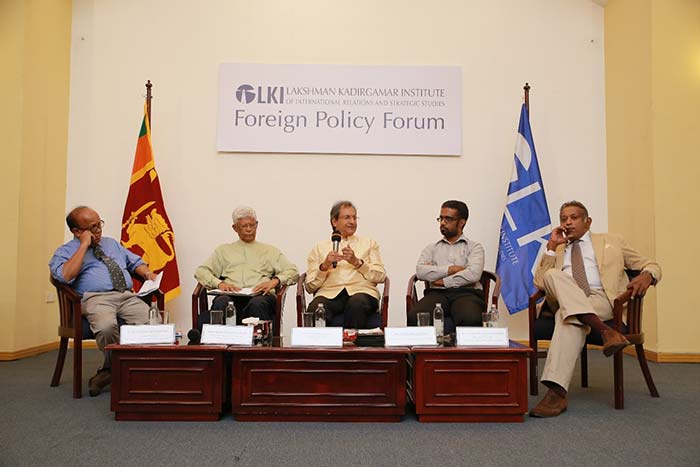News
Experts at third LKI Foreign Policy Forum call for pragmatic reassessment of non-alignment in a shifting global landscape

While the need to re-orient non-alignment to meet the changing global dynamics was regularly spoken of, Non-Aligned Movement (NAM) countries have failed to offer a cohesive strategic response and re-orientation, Lakshman Kadirgamar Institute (LKI) Executive Director Ambassador Ravinatha Aryasinha said at the third LKI Foreign Policy Forum, titled ‘Reassessing Non-Alignment in a Polarised World,’ that was held recently in Colombo.
The forum, held on a quarterly basis, brings together experts to discuss contemporary foreign policy issues and to contribute to the development of a Sri Lankan perspective on foreign policy and international relations. Ahead of the Forum, Foreign Minister M.U.M. Ali Sabry, who delivered the opening address, observed that “non-alignment means not becoming a bystander” and “that you are not forced or coerced into a camp to take sovereign decisions”.
Moderating the session which featured four prominent experts in the field, LKI Executive Director Ambassador Ravinatha Aryasinha, at the outset, emphasized the importance of understanding both – the Non-Aligned Movement (NAM) as an organization, and ‘non-alignment’ as a concept and foreign policy strategy.
He noted that for Sri Lanka, as it was to many member countries between the 1960s -1980s, NAM enabled the conceptualization/operationalization of important initiatives relevant to its membership, including the Indian Ocean Peace Zone, the Law of the Sea, a New International Economic Order, a New International Information Order and a developing country emphasis on global disarmament – many in which Sri Lanka was to play a prominent role. However, since the ending of the Cold War, non-alignment was to lose its influence in global affairs due to the diverse interests and alignments of its member states.
In recent times while the need to re-orient non-alignment to meet the changing global dynamics was regularly spoken of, NAM countries have failed to offer a cohesive strategic response and re-orientation, he observed.
Amb. Aryasinha suggested that while the voting patterns of NAM countries in the UN General Assembly during recent crises – particularly on Ukraine and the Gaza – provided an barometer to judge as to how non-aligned states were responding to issues in real-time, what the ingredients of a re-oriented non-aligned policy, however, required closer study.
The Executive Director of the Bandaranaike Centre for International Studies (BCIS) Prof. Gamini Keerawella, who focussed on the evolution of the NAM, noted that it had three distinct phases where emphasis was on; first de-colonization, second on meeting the cold war challenges, and third in grappling with post-cold war dynamics. He cautioned against analysing Sri Lanka’s foreign policy in the early period, solely through the lens of non-alignment, referring to examples such as that Prime Minister D.S Senanayake’s neutrality was complemented by a defence agreement with the UK, and Prime Minister Sirimavo Bandaranaike’s non-aligned approach with permission for U.S vessels to access Sri Lankan ports. He emphasised that the disintegration of the Soviet Union did not necessarily mean a win for the U.S, and that emerging challenges have required a re-definition of foreign policy in non-aligned nations.
He cautioned that current Sri Lanka foreign policy, too, should not be analysed solely in terms of non-alignment, but must additionally take into account; the domestic, South Asian (mainly India related), Indian Ocean Region, and global contexts, as well.
Former Foreign Secretary and Chairman of the Pathfinder Foundation Ambassador Bernard Goonetilleke referred to the emergence of multi-polarity on the international stage and the current outlook of the global economy where in the next decade, China, the U.S and India will be the three largest economies. He said countries like Sri Lanka cannot rely on the benevolence of these global economic powers and non-aligned countries must establish their own leverage for economic gain. He explained that it requires non-aligned foreign policy to be fine–tuned, and for the 120-strong Non-Aligned Movement to re-group and re-invent itself, rather than being passive.
He observed that in the case of Sri Lanka, while President Gotabaya Rajapaksa embraced neutrality and publicly declared this position at the inauguration ceremony in Anuradhapura in 2019, beyond expressing this intent, there had been limited follow up. Five years on, he argued that we must assume that Sri Lanka is continuing to pursue this position of neutrality and non-alignment. Amb. Goonetilleke highlighted how nations have shifted alliances based on their perceived self-interests without knowing the long-term consequences of such decisions. He reiterated the need for Sri Lanka to prioritise domestic interests and to ensure that a comprehensive foreign policy serves to empower the nation amidst shifting global dynamics.
Dr Paikiasothy Saravanamuttu, Executive Director of the Centre for Policy Alternatives (CPA), questioned “what non-alignment means in the modern day and what are you non-aligning against”. He challenged traditional notions of non-alignment, advocating for a more nuanced understanding in today’s geopolitical context. Rather than rigid ideological stances, he questioned whether pragmatic decision-making, such as voting based on self-interest, could be considered a form of non-alignment, citing Singapore’s foreign policy approach as a convincing example.
He also said NAM does not offer resolutions on challenges that arise from non-western interventions. As the balance of power is shifting towards China and India, Sri Lanka must assess its foreign policy based on what it can gain from engaging with the rest of the world, rather than basing it on the moral authority of non-alignment, which he argued no longer exists. Specifically regarding economic prosperity, he emphasised the need for Sri Lanka to pursue advancement through aligning with those countries that bring the greatest economic benefits, rather than sacrificing economic leverage, through adopting a non-aligned foreign policy.
Chief International Relations Analyst, Factum, Uditha Devapriya saw pragmatism as increasingly having come to define non-alignment, resulting in some contradictions and ambiguities even with respect to Sri Lanka. Observing that Sri Lanka’s foreign policy decisions omit valuable perspectives from the grassroots level, he said while southern perspectives place emphasis on engaging with bilateral partners, northern perspectives consider foreign policy to be a secondary concern behind the prioritisation of Tamil rights and recognition.
He further elaborated that the Sri Lankan people on the ground were deeply suspicious of being given aid with strings attached. He advocated for a proactive foreign policy strategy that takes consistent decisions that align with past policies, and has credibility both domestically and internationally. He urged that public opinion should influence these decisions and experts must engage more with policymakers so that decisions are sustainable and address broader challenges in the Global South.
News
US sports envoys to Lanka to champion youth development

The U.S. Embassy in Colombo welcomed the U.S. Sports Envoys to Sri Lanka, former National Basketball Association (NBA) and Women’s National Basketball Association (WNBA) players Stephen Howard and Astou Ndiaye, from June 8 through 14.
The Public Diplomacy section of the U.S. Embassy said that it would launch a weeklong basketball program intended to harness the unifying power of sports, made possible through collaboration with Foundation of Goodness and IImpact Hoop Lab.
While in Sri Lanka, Howard and Ndiaye, both retired professional basketball players, will conduct a weeklong program, Hoops for Hope: Bridging Borders through Basketball. The Sports Envoys will lead basketball clinics and exhibition matches and engage in leadership sessions in Colombo and Southern Province for youth aged 14-18 from Northern, Uva, Eastern and Western Provinces, offering skills and leadership training both on and off the court. The U.S. Envoys will also share their expertise with the Sri Lanka Basketball Federation, national coaches, and players, furthering the development of basketball in the country. Beyond the clinics, they will collaborate with Sri Lankan schoolchildren to take part in a community service project in the Colombo area.
“We are so proud to welcome Stephen and Astou as our Sports Envoys to Sri Lanka, to build on the strong people-to-people connections between the United States and Sri Lanka,” said U.S. Ambassador Julie Chung. “The lessons that will be shared by our Sports Envoys – communication, teamwork, resilience, inclusion, and conflict resolution – are essential for leadership development, community building, equality, and peace. The U.S. Sports Envoy program is a testament to our belief that sports can be a powerful tool in promoting peace and unity.”
News
Rahuman questions sudden cancellation of leave of CEB employees

SJB Colombo District MP Mujibur Rahuman in parliament demanded to know from the government the reasons for CEB suspending the leave of all its employees until further notice from Thursday.
MP Rahuman said that the CEB has got an acting General Manager anew and the latter yesterday morning issued a circular suspending leave of all CEB employees with immediate effect until further notice.
“We demand that Minister Kanchana Wijesekera should explain this to the House. This circular was issued while this debate on the new Electricity Amendment Bill was pending. There are many who oppose this Bill. The Minister must tell parliament the reason for the urge to cancel the leave of CEB employees,” the MP said.However, Speaker Mahinda Yapa Abeywardena prevented Minister Wijesekera responding to the query and said that the matter raised by MP Rahuman was not relevant.
News
CIPM successfully concludes 8th Annual Symposium

The Chartered Institute of Personnel Management (CIPM) successfully concluded the 8th Annual CIPM Symposium, which took place on 31st May 2024. Themed “Nurturing the Human Element—Redefining HRM in a Rapidly Changing World,” the symposium underscored the pivotal role of human resource management (HRM) in today’s dynamic global landscape. Since its inception in 1959, CIPM has been dedicated to advancing the HR profession through education, professional development, and advocacy, solidifying its position as Sri Lanka’s leading professional body for HRM.
Ken Vijayakumar, the President of the CIPM, graced the occasion as the chief guest. The symposium commenced with the welcome address by the Chairperson, Prof. Arosha Adikaram, followed by the Web Launch of the Symposium Proceedings and Abstract Book by the CIPM President. The event featured distinguished addresses, including a speech by Chief Guest Ken Vijayakumar, President of CIPM, and an address by Guest of Honor Shakthi Ranatunga, Chief Operating Officer of MAS Holdings Pvt. Ltd., Sri Lanka.
The symposium also featured an inspiring keynote address by Prof. Mario Fernando, Professor of Management and Director of the Centre for Cross Cultural Management (CCCM) at the University of Wollongong, Australia.
Vote of Thanks of the inauguration session was delivered by Dr. Dillanjani Weeratunga, Symposium Co-chair.
The symposium served as a comprehensive platform for researchers to present their findings across a wide range of critical topics in HRM. These included Cultural Diversity and Inclusion, Talent Development and Retention, Ethical Leadership and Corporate Social Responsibility, Adapting to Technological Advancements, Mental Health and Well-being at Work, Global Workforce Challenges, Employee Empowerment, and Reskilling and Upskilling.
The plenary session was led by Prof. Wasantha Rajapakse. Certificates were awarded to the best paper presenters during the valedictory session, followed by a vote of thanks delivered by Kamani Perera, Manager of Research and Development.
The annual symposium of CIPM was a truly inclusive event, attracting a diverse audience that spanned undergraduates, graduates, working professionals, research scholars and lecturers. This widespread interest highlights the symposium’s significance in the field of HRM, offering a unique opportunity for everyone to network and learn from scholarly brains.The CIPM International Research Symposium was sponsored by Hambantota International Port, Sri Lanka Institute of Information Technology (SLIIT), E B Creasy & Co. PLC, and Print Xcel Company.














